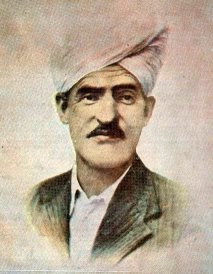Mansha Ashraf
Peerzada Ghulam Ahmad Mahjoor commonly known as Shair-e-Kashmir is one of the most remarkable lyrical poet of modern Kashmiri poetry. Eminent poet of India Rabindranath Tagore always referred to Mahjoor as Wordsworth of Kashmiri poetry. He was born in Mitrigam, Pulwana on August 11, 1887. Mahjoor first worked as a patwari (village accountant). During these years he got an opportunity to spend many years in various parts of Jammu and Kashmir including Leh and Kargil. As a result of his stay he started to learn the richness and sweetness of Kashmiri language, especially its woes and wishes.
Mahjoor in his earlier days wrote only love poems but later started writing elemental poems about freedom and progress in Kashmir. Through his poetry he started appealing to the nation not to get divided on the basis of religion and community. In one of his masterpiece “Gulshan WatanChu Soney” he expresses his love for his birthplace:
T he bulbul sings to the flowers:
he bulbul sings to the flowers:
‘A garden is our land!’
Mahjoor, our motherland
Is the loveliest on earth!
Shall we not love her best?
A garden is our land.
He was driven by the suffering of the common people during the barbarous Dogra regime. He contributed a lot of ignition and fire to freedom struggle. His poetry served as a clarion call to the masses to free their nation from the chains of slavery. His patriotic poem “Walo Ho BagheWano” (Arise, O Gardener) translated by Raina. T.N, he says:
“If thou wouldst rouse this habitat of roses,
Leave toying with kettle-drums
Let there be thunder__ storm and tempest,
Aye an earthquake .”
These verses in Kashmir became so popular that the National Conference ratifies it as a national anthem. But he was taken into custody for writing these lines and soon got released. Mahjoor imbibes the universal appeal and soberness of Mirza Asadullah Beg Khan (Ghalib) in his immortal verses.
His unique poetry represents pain of humans, concerns of the poor and suppressed people, injustice, cruelty and anarchy against them. Mahjoor started his career as a poet only after getting inspired by his elder contemporary Habba Khatoon. He also springs directly from Kashmir’s collective psyche attaining a heroic status and an inerasable imprint.
His poetry was published under three different titles during his lifetime namely Kalaam-i-Mahjoor, Payaam-i-Mahjoor and Salaam-i-Mahjoor.
The herculean task of translating a considerable number of Mahjoor’s Kashmiri poetry into English was first taken up by T N Kaul in 1982 followed by Trilokinath Raina’s two anthologies “An Anthology of Modern Kashmiri Verse” (1972) and “The Best of Mahjoor” (1989).
The author can be mailed at sheikhmansha5@gmail.com





